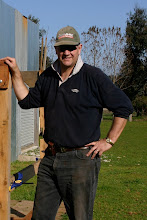People who know that I was once a cyclist and love watching the Tour de France each July have asked me how I feel about Lance Armstrong. It's actually a difficult question - one I don't know quite how to answer.
Perhaps it's a bit like boxing for me.
I remember listening to radio commentary of Muhammad Ali's first fight against Henry Cooper - when he was still Cassius Clay. I was 9 years old.
Muhammad Ali was then a constant of my youth - I grew up with him. I still think of him as one of the great people of my age. I loved his rebellion, I loved his humanity, I loved the dimensions of his talent that adversity uncovered - I loved it that conservative / conventional people hated him.
But in the end - boxing was, is and always will be a corrupt and brutal enterprise. As I look back now, I'm almost embarrassed by the pleasure I took from events like the Rumble in the Jungle or the Thriller in Manilla. When I see them now on ESPN - I'm drawn .... but can't take pleasure the way I would have in the past.
As I was losing the stomach for boxing in the 1980s and was becoming a half decent bike rider - SBS was showing half hour highlights of each Le Tour stage - and viewers were being introduced to the complexities of the sport by Phil Liggett. Over the years I became more and more hooked - until now (with my more flexible schedule) I will watch most of the mountain stages live (on TV) each year. They run from about 10pm to 2am - quite a commitment for a 'morning person'.
So I watched every one of Armstrong's Tour victories - start to finish. His 'look' back at Jan Ullrich on L'Alpe d'Huez. A couple of ascents of Mont Ventoux with Marco Pantani and Joseba Beloki. And every time trial he ever did (almost).
[I can personally relate to a time trial better that a mountain stage. I could never drag my hundred plus kilogram frame up a hors catagorie climb, but I used to be able to get my big old engine wound up to over 40 kmph for longish periods. I never quite did a 40 km time trial in an hour - but I got pretty close.]
I read Armstrong's first autobiography 'It's not about the bike' - 10 years ago and enjoyed it. It made plain just what a tough 'trailer park thrash' type background he came from. I was a bit discomfited by the way he had dropped the girlfriend who supported him through the cancer treatment. And it was also very clear that he was an extraordinarily focused guy - capable of pushing himself (and others) very hard. But I recommended the book to others - and even bought it for a few people. Which, for me, is a bit of a statement about how much I admire someone.
It was year or two later that the first crack opened in my regard for him - when he left his wife and young family for Sheryl Crow. In my world you don't do that - and preserve my respect / admiration at least. So thereafter I would have more regarded him (and think I did) as an extraordinary athlete.
So coming back to his use of drugs.
Having read a bit about the history of the Tour, I'm not sure that its not as flawed / corrupt (almost) as boxing. They talk about drug use as being pretty much a constant shadow - as far back as the first tours before WW1. Certainly there is the terrible story of Tom Simpson's death on Mont Ventoux in 1967 - ascribed to amphetamine use.
So part of me doesn't want to over condemn Armstrong even now. Is the right way to look at this to say that cycling has always had a battle between good and evil in its soul - at the administrative level? Then the same battle goes on at the team level - and the individual competitor level.
I don't support going after Armstrong and an alleged 'few bad (competitor) apples' and leaving the administration / management level alone. I'd almost support the reverse - a complete amnesty for all competitors in return for a total focus on how the governing bodies allowed this to happen.
That's never going to happen - but I wonder whether it's this sort of angle that Armstrong's confession and 'assistance' is going to take?
And if a quixotic quest against cycling officialdom were to meet with any success ... well there would be the Olympic Committee and FIFA to go on to.




The worst thing about Lance wasn't that he was a cheater, although that is bad, quite bad, many if not most of the leading cyclists were cheaters. No, the worst thing about Lance was his willingness, even eagerness, to ruin the lives of others to perpetuate and protect his fraud.
ReplyDelete-RAS
I agree his behaviour towards others was outrageous. I did think, however, that he came across in the interview very much as he described himself in 'It's not about the Bike'. He is one tough guy. He's a 'control freak'. He seemed to 'own' this. I'm more alarmed by the suggestions that he flat out lied in relation in parts - for legal reasons. That would be consistent with past behaviour - but not with any chance of 'redemption'.
ReplyDelete